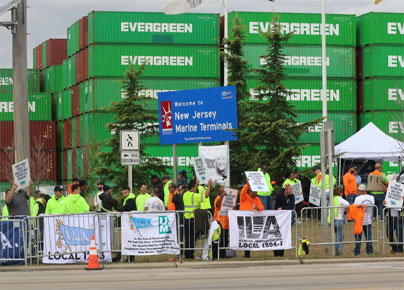U.S. port workers and operators reach a deal to end strike
2024-10-04

U.S. dock workers and port operators have reached a tentative deal to immediately end a three-day strike that has shut down shipping on the U.S. East Coast and Gulf Coast.
The tentative agreement is for a wage hike of around 62% over six years. That would raise average wages to about $63 (€57) from $39 an hour over the contract's life.
The International Longshoremen's Association (ILA) workers union had been seeking a 77% raise, while the employer group, United States Maritime Alliance (USMX), had previously raised its offer to a nearly 50% hike.
The deal ends the biggest work stoppage of its kind in nearly half a century. It blocked the unloading of containerships from Maine to Texas and threatened shortages of everything from bananas to auto parts, triggering a backlog of anchored ships outside major ports.
JP Morgan analysts have said the strike would cost the U.S. economy around $5 billion daily.
The union and the port operators said they would extend their master contract until January 15, 2025, to return to the bargaining table and negotiate all outstanding issues.
"Effective immediately, all current job actions will cease, and all work covered by the Master Contract will resume," the statement said.
Among the unresolved issues is automation, which workers say will lead to job losses.
U.S. President Joe Biden's administration has sided with the union, putting pressure on the port employers to raise their offer to secure a deal and citing the shipping industry's bumper profits since the Covid-19 pandemic.
The tentative deal "represents critical progress towards a strong contract," Mr. Biden said.
His administration has repeatedly resisted calls from business trade groups and Republicans to use federal powers to halt the strike. This move would undermine democratic support among unions ahead of the November 5 U.S. presidential election.
The strike affected 36 ports - including New York, Baltimore and Houston - that handle a range of containerised goods.
Economists have said the port closures would not initially raise consumer prices because companies had accelerated shipments of critical goods in recent months. However, according to Morgan Stanley economists, prolonged stoppage would eventually filter through, with food prices likely to react first.
U.S. East Coast and Gulf Coast ports began reopening on Thursday night after dockworkers and port operators reached a wage deal to settle the industry's most significant work stoppage in nearly half a century; however, clearing the cargo backlog will take time.
At least 54 container ships queued up outside the ports over three days as the strike prevented unloading and threatened shortages of everything from bananas to auto parts. The figure by Everstream Analytics was calculated at 4:00 p.m. E.T. (2000 GMT). More ships are sure to arrive. "The decision to end the current strike and allow the East and Gulf coast ports to reopen is good news for the nation's economy," the National Retail Federation said in a statement. "The sooner they reach a (final) deal, the better for all American families." The International Longshoremen's Association (ILA) had launched the strike by 45,000 port workers, its first significant work stoppage since 1977 after talks for a new six-year contract broke down.









